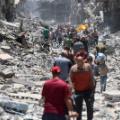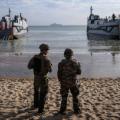We've wrapped up our live coverage for the day. You can read more about Russia's war in Ukraine here, or scroll through the updates below.
September 23, 2023 Russia-Ukraine news
By Hafsa Khalil, Tori B. Powell, Thom Poole and Matt Meyer, CNN
Russian foreign minister says the US is “directly at war” with Moscow
From CNN’s Sahar Akbarzai
Russian Foreign Minister Sergey Lavrov said Saturday that the United States and other allies of Ukraine are "directly at war" with Moscow.
Lavrov had been asked by a journalist at what point the US becomes directly involved in war against Russia, as opposed to engaged in a proxy conflict.
“You can call this whatever you want to call this, but they are directly at war with us. We can call this a hybrid war, but that doesn’t change the reality,” Lavrov said. “They are effectively engaged in hostilities with us, using the Ukrainians as fodder,” he added.
The foreign minister said the US, the United Kingdom and many others are “waging war” against Russia and are engaged in hostilities against the country.
Lavrov said the US and other countries are delivering greater and greater quantities of weapons to Kyiv, while military satellites and intelligence aircraft from the countries are also used against Moscow.
Some context: Moscow has often framed its invasion of Ukraine, which it usually refers to as a "special military operation," as a struggle against attempts by Western powers to dominate on a global stage.
Kyiv's allies and international bodies have dismissed this characterization, saying they are helping defend Ukraine from an unprovoked invasion and attempt to seize territory.
Russian foreign minister blames UN and Ukraine for grain deal's collapse
From CNN's AnneClaire Stapleton
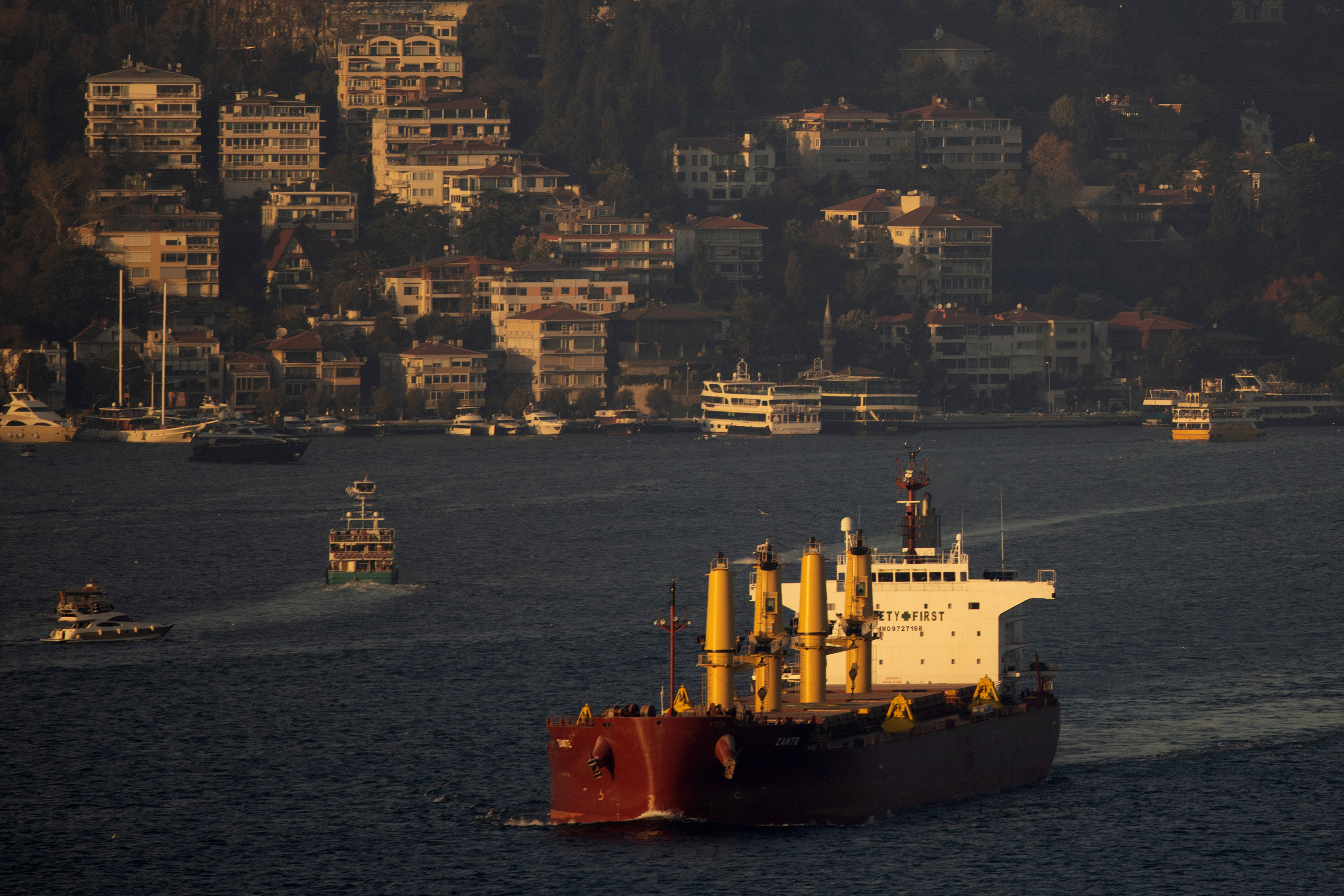
Speaking Saturday, Russian Foreign Minister Sergey Lavrov blamed the collapse of the Black Sea grain deal on what he described as broken promises by Ukraine and the United Nations.
In remarks after his speech at the UN General Assembly in New York, Lavrov said Russia left the crucial deal because "everything that was promised to us turned out to be a deception."
Lavrov said the deal — which was brokered by Turkey and the United Nations in July 2022, but fell apart a year later — rested on guarantees to both Kyiv and Moscow.
"If the Ukrainian part of the package was carried out quite efficiently and quickly, then the Russian part was not carried out at all," Lavrov said.
As grain began to flow through reopened Black Sea corridors, Ukraine used those same passages to launch drone attacks on Russian ships, the foreign minister claimed.
"We warned several times. This also did not stop," he added.
Some context: The deal became necessary after Russia invaded Ukraine and placed a blockade on its Black Sea ports. The pact had allowed Ukraine to once again export grain by sea, with ships bypassing the blockade and navigating safe passage through the waterway to Turkey’s Bosphorus Strait in order to reach global markets.
Moscow complained throughout the deal that while Ukrainian grain was allowed to flow, Russia was prevented by various sanctions from adequately exporting its own foodstuffs. Russian President Vladimir Putin said the stated objective of the deal – supplying grain to countries in need – had "not been realized," because of Russia's export obstacles.
Ukraine has launched numerous attacks on targets in the Black Sea, including Russian ships and naval bases. Russia's Black Sea Fleet headquarters was targeted in a major strike on Friday.
Ukrainian officials say attacks on Russian targets in the Black Sea are justified because Moscow is occupying Kyiv's territorial waters.
Ukrainian peace plan isn't "realistic," Russian foreign minister says at the UN
From CNN's Sahar Akbarzai and Darya Tarasova
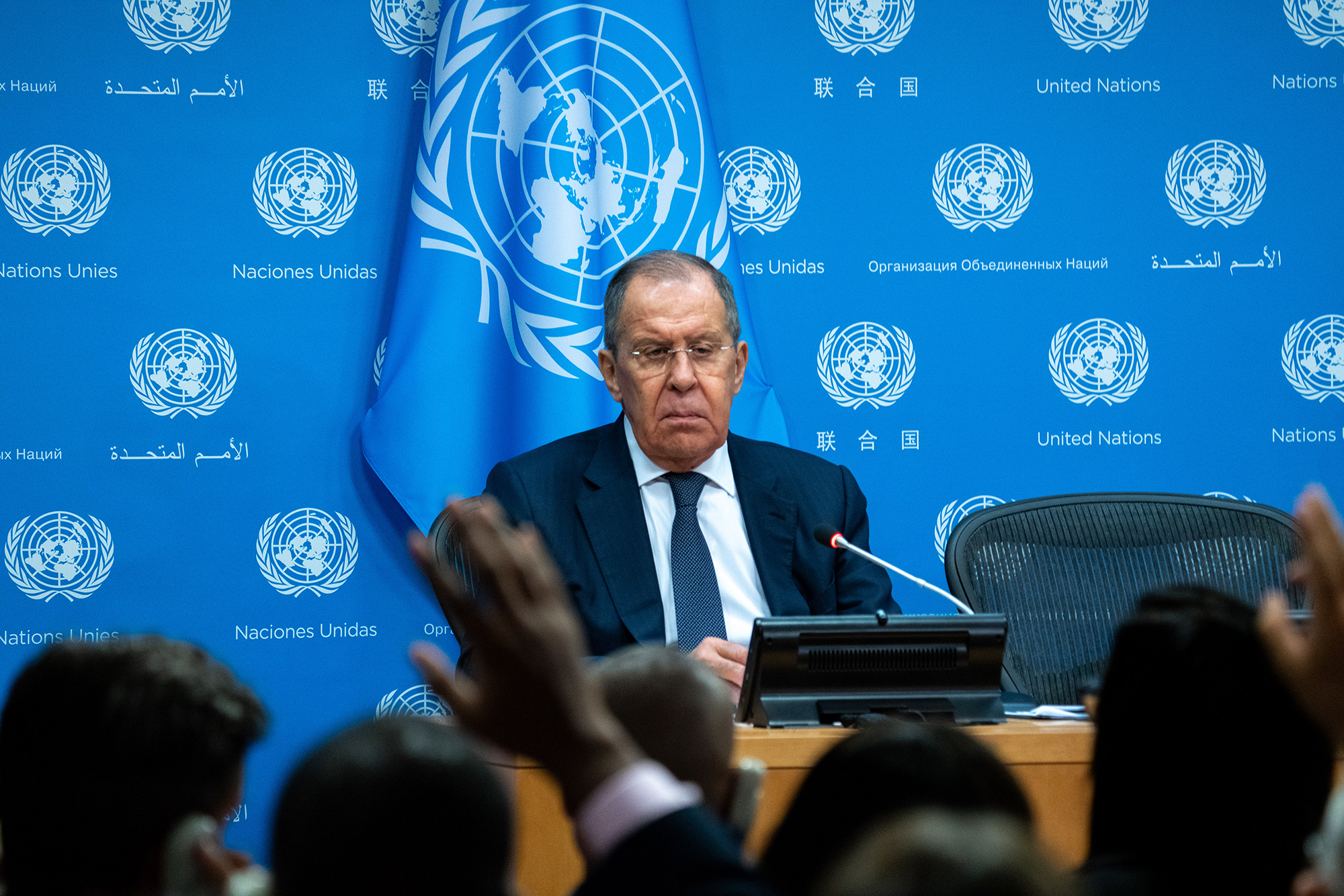
Ukraine's blueprint for peace is not “feasible” or “realistic,” Russian Foreign Minister Sergey Lavrov said Saturday in a news conference at the United Nations General Assembly in New York.
Lavrov said everyone understands that Ukrainian President Volodymyr Zelensky’s peace formula — which he has said cannot include ceding any territory to Russia — is not feasible.
But “at the same time, everyone says this is only conditions for negotiation,” Lavrov said.
The foreign minister was asked if Moscow would hold talks with the Ukrainian government if Zelensky withdrew his decree preventing negotiations with Russia. He responded by saying that's not what Ukraine is doing, saying Zelensky is instead "going throughout the world asking for money" and weapons and attention.
More on Ukraine's peace plan: Zelensky presented Ukraine’s 10-point peace formula to world leaders at the Group of 20 summit in Bali, Indonesia, last year.
The steps include a path to nuclear safety and food security, a special tribunal for alleged Russian war crimes, and a final peace treaty with Moscow.
Zelensky — who initially proposed meeting with Russian President Vladimir Putin in the early days of Moscow's invasion — has expressed concerns about negotiating with Russia, pointing to its past record of reneging on agreements.
Lashing out at the West: In an earlier speech at the UNGA Saturday, Lavrov also slammed the US, European Union and NATO military alliance for their support of Ukraine, calling the West an "empire of lies."
The foreign minister said governments supporting Ukraine were part of an effort to "divide the world into democracies and autocracies and dictate only their own neocolonial rules to everyone."
Moscow has justified its invasion of Ukraine, which it usually refers to as a "special military operation," by framing it as a campaign of “denazification” — a description dismissed by historians and political observers — and as a struggle against Western powers who want to destroy Russia.
More on the summit: The two-week UNGA summit has brought together 140 heads of state and government, and featured addresses from US President Joe Biden and Ukraine'sZelensky.
Putin, who now risks arrest when he travels, is not expected to attend any portion of the gathering.
Russia remains a member of the UN Security Council, despite multiple demands from the council to end the war in Ukraine. Zelensky called this week for the Security Council to remove Russia's veto power, arguing "this will be the first necessary step."
CNN's Caitlin Hu contributed to this report.
3 more ships pass through designated Black Sea corridors to load at Ukrainian ports
From CNN's AnneClaire Stapleton
Three more ships passed through humanitarian corridors in the Black Sea to load at Ukrainian ports this week, US Ambassador to Ukraine Bridget A. Brink said Saturday.
“Two outbound ships carrying grain destined for ports in Africa, Asia and the Middle East are now on their way to the Bosphorus," Brink added in a post on X, formally known as Twitter. "Despite Russia’s withdrawal from the Black Sea Grain Initiative, Ukraine continues its efforts to feed the world."
Some context: Russia pulled out of a UN and Turkish brokered deal in July that had allowed Ukraine to export grain via Black Sea shipments. Moscow warned that any ships headed to Ukraine would be treated as potentially carrying weapons.
Last month, the Ukrainian navy issued an order declaring "temporary corridors" for merchant ships sailing to and from Ukrainian ports, though it admitted there was still a threat of encountering mines or attacks by Russia along all routes.
Here's what Ukraine's troops are focused on accomplishing along the southern front, according to top general
From CNN’s Vasco Cotovio, Frederik Pleitgen, Daniel Hodge and Konstyantyn Gak

The general leading Ukraine's fight along the southern front line spoke this week about his focus in the fiercely contested Zaporizhzhia region.
Gen. Oleksandr Tarnavsky believes Ukraine’s big breakthrough — the biggest of its ongoing counteroffensive — is yet to come, he told CNN’s senior international correspondent Frederik Pleitgen during an exclusive interview Friday.
"I think it will happen after Tokmak," Tarnavsky said, referring to a city that serves as a southern strategic hub for Russia, located about 20 kilometers (12 miles) from the positions where Ukrainian troops are currently fighting. "At the moment they are relying on the depth of their defensive line there.”
Rather than the "Surovikin line," which is a defensive line built on the orders of former Gen. Sergey Surovikin, Tarnavsky says the bigger issues are the “crossroads, tree lines and minefields between the tree lines.”
“(There’s) a combination of small, harmful enemy defense groups that currently are planted very precisely and competently,” he said. “But the actions of our fighters force them to slowly pull back when they face our assault squads.”
Positive about the ultimate outcome, the general conceded that for the counteroffensive to be a success, Ukrainian forces need to at least reach Tokmak.
“Tokmak is the minimum goal,” he said. “The overall objective is to get to our state borders.”
Tarnavsky said Friday that his forces had made a breakthrough near the village of Verbove, located northeast of Tokmak in Ukraine's southern Zaporizhzhia region.
What we know about the attack on Russia's Black Sea Fleet headquarters
From CNN staff
Ukraine has launched one of its most ambitious attacks yet on Crimea, targeting Russia's Black Sea Fleet headquarters in Sevastopol. The Crimean peninsula was illegally annexed by Russia in 2014, and Ukraine has vowed to reclaim it. Here's what we know:
- What happened? Ukraine said its forces carried out a “successful” missile attack on the naval HQ Friday. A fire broke out in the aftermath of the attack, which also left debris scattered hundreds of meters away. Plumes of smoke could be seen pouring from the building, while officials also said shrapnel landed in a nearby theater.
- What has Ukraine said? The country’s Special Operations Forces said Saturday that the strike was timed for when senior members of Russia's navy were convening and has left dozens dead and wounded, “including senior leadership.” Ukrainian officials have commented on the strike, with the chairman of the Mejlis of the Crimean Tatar People in Ukraine, Refat Chubarov, thanking those involved in the operation to "liberate" Crimea. Another Ukrainian official said that Russia's Black Sea Fleet could be "sliced up like a salami."
- What has Russia said? Russia’s Ministry of Defense has said only one soldier is missing following the attack. “As a result of the attack, the historical headquarters building of the Black Sea Fleet was damaged,” the defense ministry stated, adding that five missiles were also shot down by their air defense systems. CNN has not been able to verify Ukraine's claim it killed Russian naval leaders.
- What does it mean for the war? Hitting Russian facilities on occupied Crimea is a display of Ukraine's confidence — and the vulnerability of said vital infrastructure.There are plenty of reasons for Ukraine to target Crimea. It’s a sign that despite the slow progress on the front lines in its counteroffensive, Ukraine can still inflict serious damage on the Russian military. Targets such as the Crimea bridge have considerable symbolic value as well as strategic purpose. Ukrainian Defense Intelligence spokesperson Andrii Yusov said “the ultimate goal, of course, is the de-occupation of Ukrainian Crimea.”
New sanctions against Russia "cause more harm to Europe than Russia," Hungarian minister says
From CNN's Mariya Knight

New sanctions against Russia are not needed because they "cause more harm to Europe than Russia," Hungary's Foreign Minister Péter Szijjártó said in an interview with Russian state media TASS Friday.
Szijjártó said he was speaking from a "pragmatic point of view," according to TASS, adding that "the new packages of sanctions are not necessary."
The foreign minister said supplies of Ukrainian grain to Central European countries will destroy their agricultural sector.
"If Ukrainian grain starts to spread into Central European countries, it will definitely destroy the agricultural markets of Central Europe. Not to mention our farmers, whom we obviously need to protect," Szijjártó continued, as cited by TASS.
Poland and Slovakia have also imposed restrictions on Ukrainian grain exports, citing the same reasons, after the European Union decided not to extend its ban on imports into those countries and fellow EU states Romania and Bulgaria.
According to Szijjártó, Hungary is ready to provide free transit of Ukrainian grain through its territory. He also noted that initially, the agreement on lines of solidarity implied permission for the transit of Ukrainian agricultural products only.
"As I understand it, they (Ukraine) would prefer to distribute grain in Central Europe, but the original agreement on lines of solidarity was not about that," he said, according to TASS, adding that the agreement implied "permission for transit, and not for bilateral trade."
Analysis: Ukraine's attack on Crimea shows it can still inflict serious damage on Russian forces
Analysis from CNN's Tim Lister
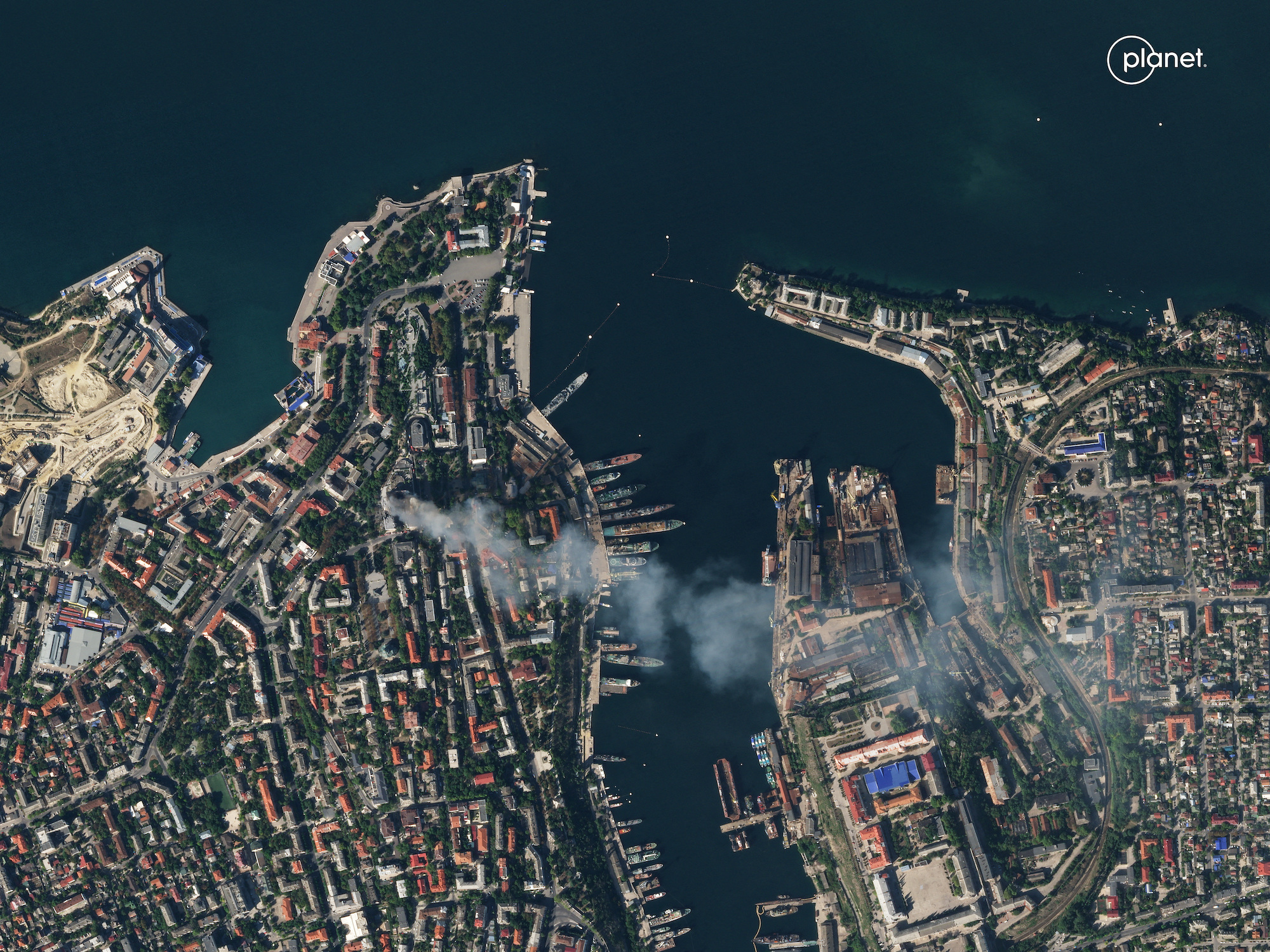
The Ukrainian missile attack on the headquarters of the Russian Black Sea Fleet is a sign that despite the slow progress on the front lines in its counteroffensive, Ukraine can still inflict serious damage on the Russian military. Targets such as the Crimea bridge have considerable symbolic value as well as strategic purpose.
It’s also part of a broader effort – in Crimea, Zaporizhzhia, Donetsk and Luhansk – to hit Russian logistics, fuel, maintenance and command centers, in order to disrupt their ability to supply the front lines.
The Russian Black Sea Fleet has been involved in hundreds of cruise missile attacks against Ukraine and threatens merchant shipping using Ukrainian ports. Any disruption to its operation and command facilities (as well as the targeting of vessels at sea and in dock) is a win, especially after the Russian withdrawal from the Black Sea Grain Initiative in July.
Ukraine has devoted considerable effort to degrading Russian air defenses in Crimea. That effort now appears to be paying off – as Ukrainian Neptune missiles (and most probably UK-provided Storm Shadows) are capable of reaching targets deep inside Crimea.
While some US officials have been critical of Ukraine's concentration on Crimea, the Ukrainians argue that targeting anything to do with the Black Sea Fleet is worthwhile.
As the Institute for the Study of War noted Thursday, “elements of the Black Sea Fleet’s 810th Naval Infantry Brigade are engaged in critical defensive operations in western Zaporizhzhia Oblast, and the Black Sea Fleet’s 22nd Army Corps is defending positions on the east bank of Kherson Oblast.”
Read the full analysis here.


